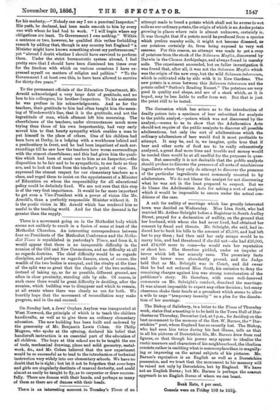To the permanent officials of the Education Department, Mr. Arnold
acknowledged a very large debt of gratitude, and no less to his colleagues, his brother-Inspectors. To his assistants he was profuse in his acknowledgments. And as for the teachers, their gratitude to him had often taught him the mean- ing of Wordsworth's line, that it is the gratitude, and not the ingratitude of man, which oftenest left him mourning. The cheerfulness of the teachers, under circumstances much more trying than those of his own inspectorship, had very early moved him to that hearty sympathy which enables a man to put himself in the place of others. One of his children had been born at Derby, in a lodging with a workhouse behind and a penitentiary in front, and he had been impatient of such sur- roundings till he saw how the teachers bore worse surroundings with the utmost cheerfulness; and this had given him the quali- ties which had been of most use to him as an Inspector,—the disposition to be fair and to be sympathetic, to see facts as they are, and to look at them from the teacher's point of view. Ile expressed the utmost respect for our elementary teachers as a class, and urged them to insist on the appointment of a Minister of Education on whom the responsibility for all educational policy could be definitely fixed. We are not sure that this step is of the very first importance. It would be far more important to get even a Vice-President with a power of vision like Mr. Arnold's, than a perfectly responsible Minister without it. It is the poetic vision in Mr. Arnold which has rendered him so useful to the teaching world. And for that the demand is far greater than the supply.


































 Previous page
Previous page